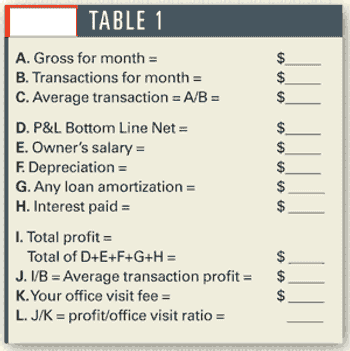
Take diplomacy out of practice: Clients shouldn't influence medical decisions

Dr. Snyder, a well-known consultant, publishes the Snyder Advisory Letter, a newsletter focused on practice productivity. He is a long-standing member of DVM Newsmagazine's Editorial Advisory Board.

Take diplomacy out of practice: Clients shouldn't influence medical decisions

Organizational procedures can help a practice deliver consistent, quality care.

While we add 48 percent more practitioners, we will have only 10 percent more pets. And... only 59 percent of pets ever see a veterinarian ...

Dentistry, including dental anesthesia, should be no less than 4.5 percent of each month's revenues.

Your homework assignment: Learn and apply the following practice mathematical rules and ratios by this time next month.

I have a present for you, Mrs. Client. It's behind that door over there. And I know you are going to love it!

I had a dream last night, probably because of dinner I over-consumed as usual.

Examination is 50 percent of the work of our profession. Examination is the key to our success or failure in the pursuit of our profession. Examination is the most botched up service performed by fully 50 percent of our colleagues in both its qualitative and quantitative aspects.

Our universe is governed by laws. Natural laws. Laws that are as immutable as the laws of gravity and thermodynamics and these impact each and every one of us every day and in every way.

Welcome back, intrepid readers.

Despite the nationwide recession, Elsewhere Animal Hospital was chuggin' along.

When I was a very much younger man, high on love and life, in the very cosmopolitan city of brotherly love sometimes called Philadelphia, I was walking back from our bookstore toward the veterinary college. Turning a corner, I fell in step with one of my favorite personalities at the college, Dr. Paul Berg, professor of surgery.

The owner of a five doctor veterinary practice in Afurpiecefrumhear, Missouri loved to hunt. Every year, he would take one of his associates with him into the wilderness to test their skills against non-patients.

1. Pay for subscriptions by credit card. That gives you federal Fair Credit Billing Act rights to dispute a bill for unsatisfactory advice in dealing with professional services, which you don't otherwise have. If you buy a turkey baster based on the magazine's recommendations and it turns out to be unsatisfactory, I would immediately ask for a refund of my subscription charges.

Back to basics: Support yourself by providing a valuable service to clients

Since the beginning of the year, I am getting more and more calls from colleagues concerned about their financial stability, the erosion of their retirement funds and with the decline in client visits, the ability of their practice to weather this recession.

Imagine yourself on a long trip. For the most part, traffic has been rolling along at 70 miles an hour on a highway with a 65-mile speed limit. You are a quarter mile behind the car ahead of you as you enter an area with a reduced speed 50 miles per hour sign, and you see a state highway patrol car just ahead with its radar pointed directly at you.

The time has come the Walrus said to speak of many things. Of shoes and ships and sealing wax and other inconsequential things.

Why is it that a fat chance is a much smaller chance than a slim chance? Huh?

A Chambord martini is made by combining 2.5 ounces of vodka with a half-ounce of Chambord liqueur, shaken with ice and poured off the ice.

Remember, clients really want a forever healthy companion

Imagine that you are at the gym bench-pressing more weight than you ever have before.

About the middle of the last century, shortly after the second consecutive war that was designed to prevent all future wars, the brain trusts of the universities of our land decided to add a hefty scoop of veterinary colleges to their intellectual diets.

I suppose, looking through my retrospectoscope, that there was never a time in our profession, when medical expertise alone, made less of an impact, and communication skills made more of a difference between economic success and just barely surviving in practice.

You know; work 52 hours a week because you just can't find an associate willing to come to work for you for less than you are taking home yourself.

In ancient China, a favorite form of slow execution was called "the death of a thousand cuts."

Ask any number of our colleagues to tell us the most challenging part of their practices.

How much profit did your practice make in 2001? Do you know? Why not?

Fee setting in veterinary medicine is chaos personified. For lack of a better term, I call it transition theory.

The longer I live, the more I realize the impact of attitude on the success or failure of veterinary practices.